Anti Inflammatory Diet Meal Plan for Weight Loss
An anti inflammatory diet is a way of eating that helps reduce chronic inflammation in your body. By following an anti inflammatory diet meal plan and making anti inflammatory recipes, you can reduce symptoms and hopefully heal auto-immune diseases, regulate your cycles, reduce anxiety, bloat and so much more.
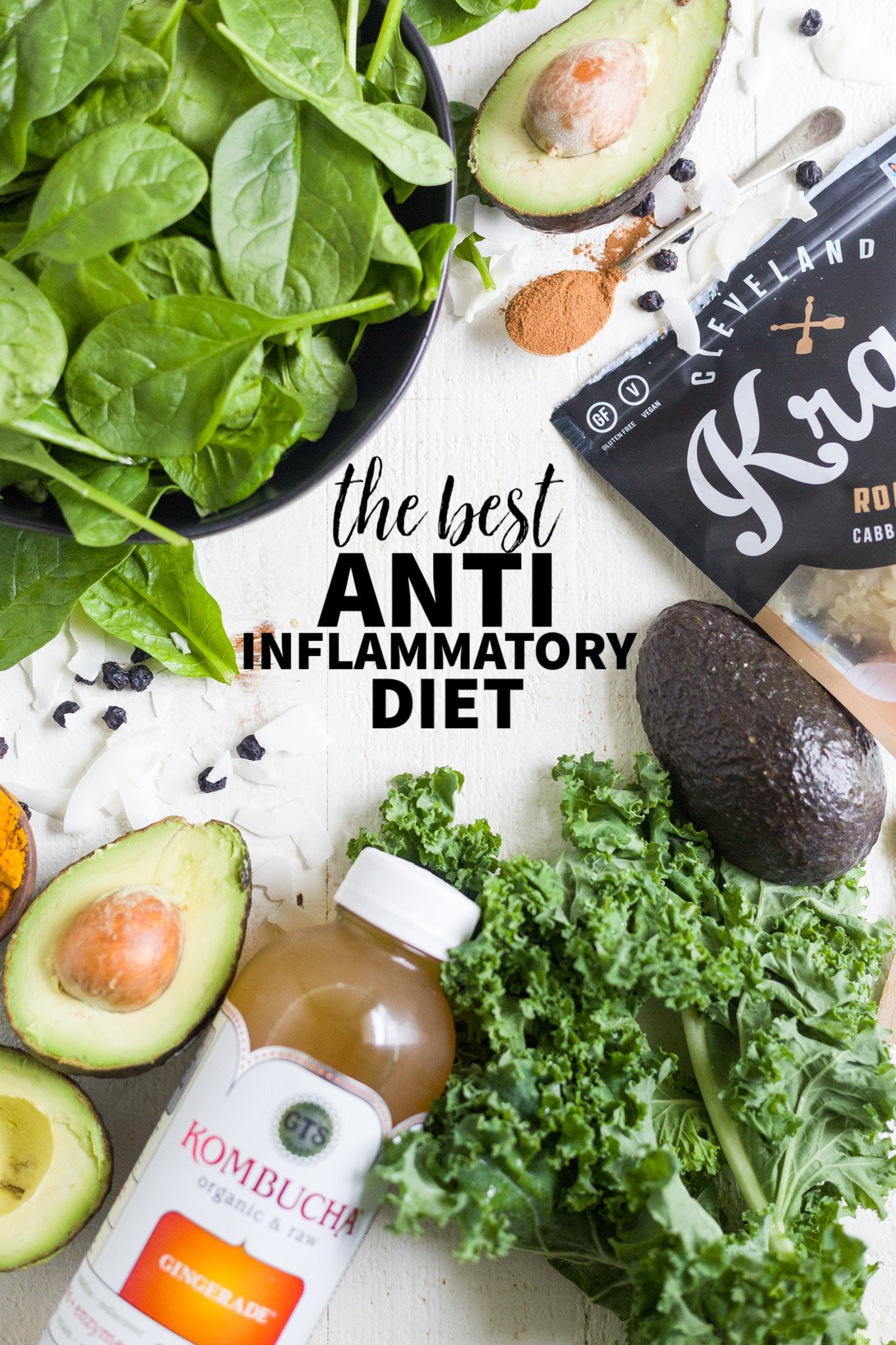
Jump to:
- Why I eat an anti inflammatory diet
- What is chronic inflammation?
- How chronic inflammation affects hormones
- Symptoms of chronic inflammation
- Why reducing inflammation is important
- What is the easiest anti-inflammatory diet?
- What are the 5 worst foods for inflammation?
- Food Sensitivity Tests for YOUR body:
- My 80-20 rule when it comes to an anti inflammatory diet:
- How to eat an anti inflammatory diet during the holidays:
- Takeaways for an anti inflammatory diet
Sources: all of this information has been pulled from Women Code, The Period Repair Manual, my functional medicine doctor and my health coach (James Fryer with Root Cause Health Advisors).
Why I eat an anti inflammatory diet
I call this my anti inflammatory diet because that's the most simple term. However, it's so much more than a diet for me. It's a way of living, it's medicine, it's a way to heal your body and feel your best. This way of eating is helping me reverse my PCOS symptoms, leaky gut, IBS, acne and anxiety. On top of eating anti inflammatory foods, I've also been eating MORE healthy, real food. The more nutrient-rich food we eat, the more nutrients our bodies absorb!
As a result, my work and relationships have thrived and I feel like I'm finally walking in my purpose.
I want to note, it's not black and white like most "diets." This is just simply the way I like to eat and principles I follow to feel my best. I don't feel guilty if I don't follow "rules".
I eat this way because it makes me feel my best and heals my body. When you think about it this way, it makes eating this "diet" so much easier. It stops becoming a way to look better and starts becoming a way to feel better. I make food decisions that serve my body, not my body image.
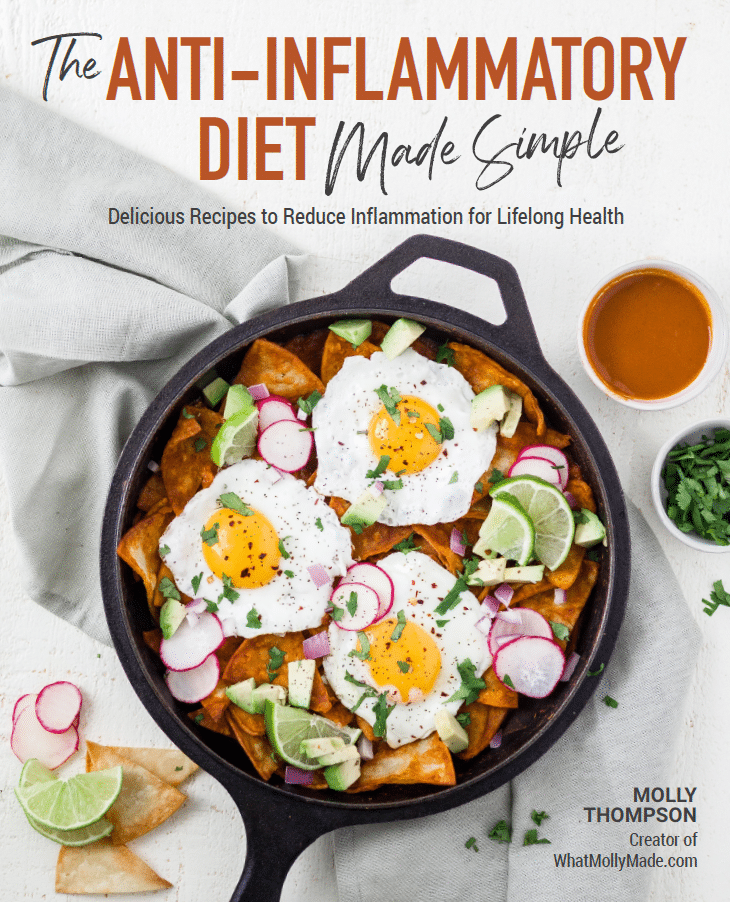
My cookbook is now available!
This book is full of 100+ simple, gluten free, dairy free recipes for feeling your best and feeding your family good, healthy food.

What is chronic inflammation?
You've probably heard this term before but you may not understand how inflammation is related to food and the way you feel day-to-day.
When you think of inflammation, you probably think of the pain and redness that occurs in your skin because of a rash. It's your body's immune response to protect itself from something harmful. Acute inflammation (virus, cold etc.) is great at protecting our bodies, but chronic inflammation in the body is not so great.
Chronic inflammation means our bodies are constantly inflamed inside and essentially attacking ourselves from the inside out. Depending on your body, it can show up in a host of different ways including digestive issues, rheumatoid arthritis, asthma, allergies, period problems and more.
How chronic inflammation affects hormones
Chronic inflammation is about more than pain and redness. It's also about whole-body communication. And is why inflammation can really mess up our cycles as women. Every different part of the body needs to talk to each other, and our hormones are a big part of that communication. Hormones are messengers for period health.
According to The Period Repair Manual, our immune system also has messengers. When chronic inflammation is present in the body, the immune system messengers insert themselves in the "conversation" with our hormone messengers, resulting in "hormonal miscommunication." This miscommunication can show up in many different ways, depending on your body, genetics and other lifestyle factors.
For me, it's irregular periods, acne, anxiety and PCOS. It's why eating anti-inflammatory is the first and most important change I made to reverse my symptoms naturally.
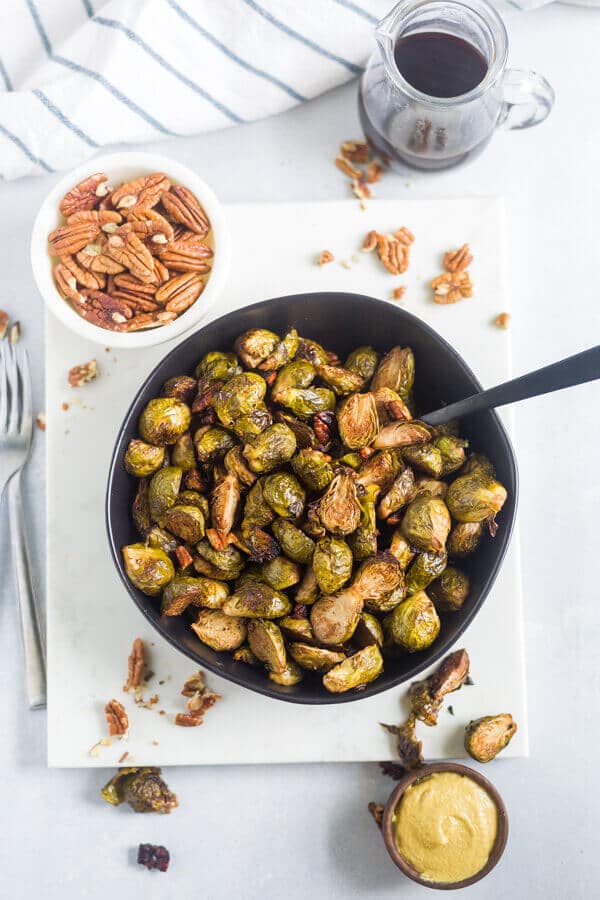
Symptoms of chronic inflammation
I always recommend talking to your doctor first, but there are some tell tale signs that should be a red flag.
- digestive issues (leaky guy, bloating, gas, IBS, constipation)
- headaches
- irregular cycles
- acne and skin problems (like psoriasis)
- mood disorders (anxiety, depression)
- trouble sleeping
- trouble losing weight and more
You can also do blood work to test for the presence of inflammation in your body. Your CRP and GGP numbers are markers for inflammation. You can read my blood work results here.
Why reducing inflammation is important
Reducing chronic inflammation in your body is so important because it's not meant to be there. When it's present your body may not be functioning to its full potential and you may not feel your best. By reducing inflammation, you can reduce or help inflammatory-caused issues like those above.
Above all, when you're free of inflammation you feel your best. When you feel your best, you live in your purpose and your cup is overflowing to help others. And that just creates a ripple effect!
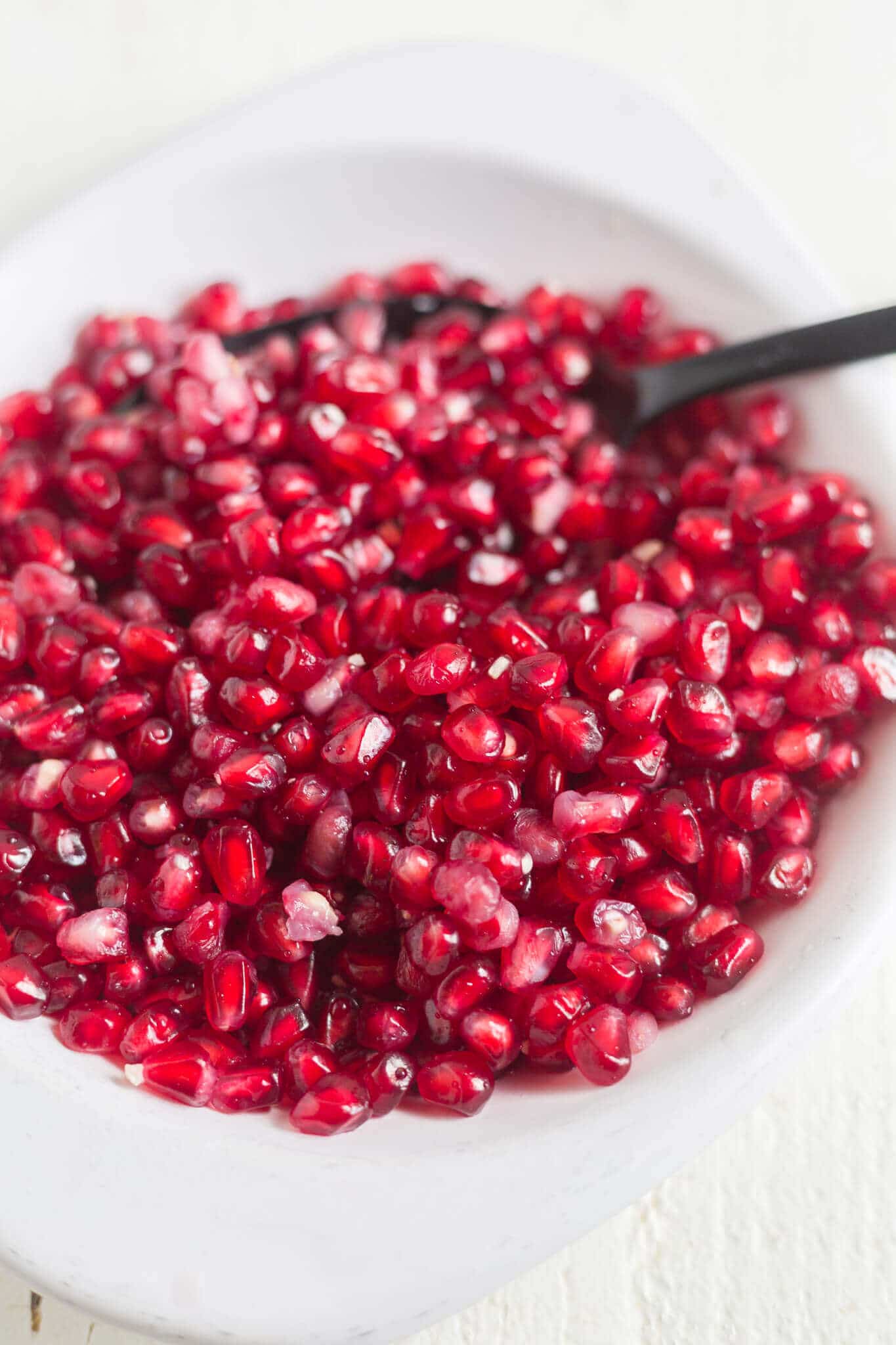
What is the easiest anti-inflammatory diet?
I like to focus more on what I should be adding to my diet, rather than restricting. When I focus on what I should be eating, the inflammatory foods just aren't present. Here are some of the foods that are great for fighting inflammation.
- Vegetables: Veggies provide important nutrients such as Vitamin C, folate and magnesium. They feed your good gut bacteria and contain phytonutrients (plant chemicals) fight inflammation.
- Fruits: Fiber and antioxidant-rich fruits are great for inflammation. Try to get a variety of colors of fruits and veggies like apples, blueberries, pomegranates and bananas.
- Whole grains: Focus on eating gluten free whole grains like quinoa, rice, amaranth and GF oats.
- Healthy fats: Fats containing Omega-3 can be found in foods like salmon, avocado, coconut oil and seeds.
- Spices: Spices are not only good for fighting inflammation, but they also make our food taste better! Some great spices include turmeric, cinnamon, ginger and garlic.
- Fermented foods: They're full of probiotics and help heal our guts. My favorite fermented foods are kombucha, sauerkraut, apple cider vinegar.
- Bone broth:It's rich in amino acids and minerals. On top of fightin inflammation, it's also great for your gut and boosts immunity. My favorite bone broth is Kettle and Fire or Vital Proteins Bone Broth Powder.
- Beans and legumes: On top of being anti inflammatory, they're also full of fiber, protein and magnesium.
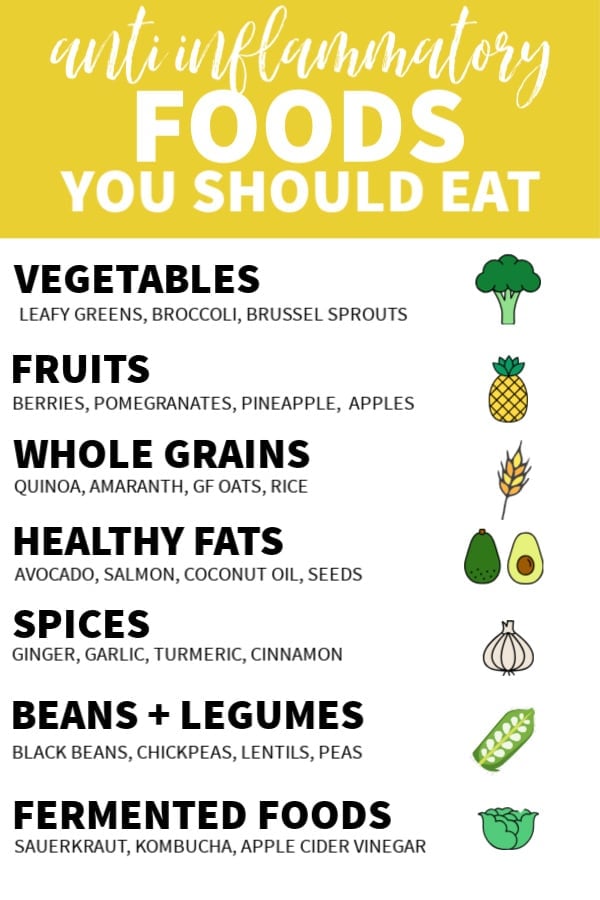
What are the 5 worst foods for inflammation?
- Sugar causes tissues damage and insulin resistance because it generates inflammation in the liver that impairs insulin sensitivity. And too much insulin can impair ovulation (for all my ladies!).
- Alcohol is usually consumed by mixing it with sugar beverages. Alcohol also shrinks the hippocampus, impairs the healthy clearance of estrogen, causes insulin resistance, damages gut bacteria, prevents nutrient absorption, impairs detoxification and depletes an anti inflammatory molecule called glutathione.
- Gluten affects all people differently, but research has found that gluten (and wheat) have an inflammatory response in 6 out of 10 women.
- Dairy is the second most common food sensitivity next to gluten. The inflammatory part of dairy is a protein called A1 casein and is inflammatory because it stimulates your immune system to create those inflammatory messengers.
- Vegetable oils contain Omega-6 and in large amounts, it can promote inflammation. It's in direct opposition with omega-3, which is anti-inflammatory. Great oils to cook with instead include olive oil, avocado oil and coconut oil.
Food Sensitivity Tests for YOUR body:
We know gluten and dairy are the most common food sensitivities, but you can also have food sensitivities specific to your body. It's important to know how your body specifically reacts to foods because we're each unique. A food sensitivity occurs when a food upsets your gut bacteria and inflames your gut lining, causing your immune system to make those inflammatory messengers.
I took an EverlyWell food sensitivity test back in January and found three major foods were extremely inflammatory for my body: almonds, eggs and egg whites. I removed those three foods from my diet (90% of the time) and found my anxiety decreased, acne was reduced, gut and IBS nearly healed and much more.
There are two great things about knowing what food sensitivities you have. The first is that knowledge is power. Once you know, you can simply eliminate or reduce that food to decrease inflammation. The second is that you can reverse food sensitivities once you know what they are??
To reverse food sensitivities: Get a test done, avoid highly sensitive foods, rebuild your gut flora through a probiotic supplement and fermented foods and eat gut-healing supplements like bone broth and glutamine.
After doing all of the above for 10 months I took another food sensitivity test and was SO EXCITED to see that all three of my high sensitivities were lowered.
Note: I was given another food sensitivity test by EverlyWell for this post. It is not sponsored and all opinions are my own.
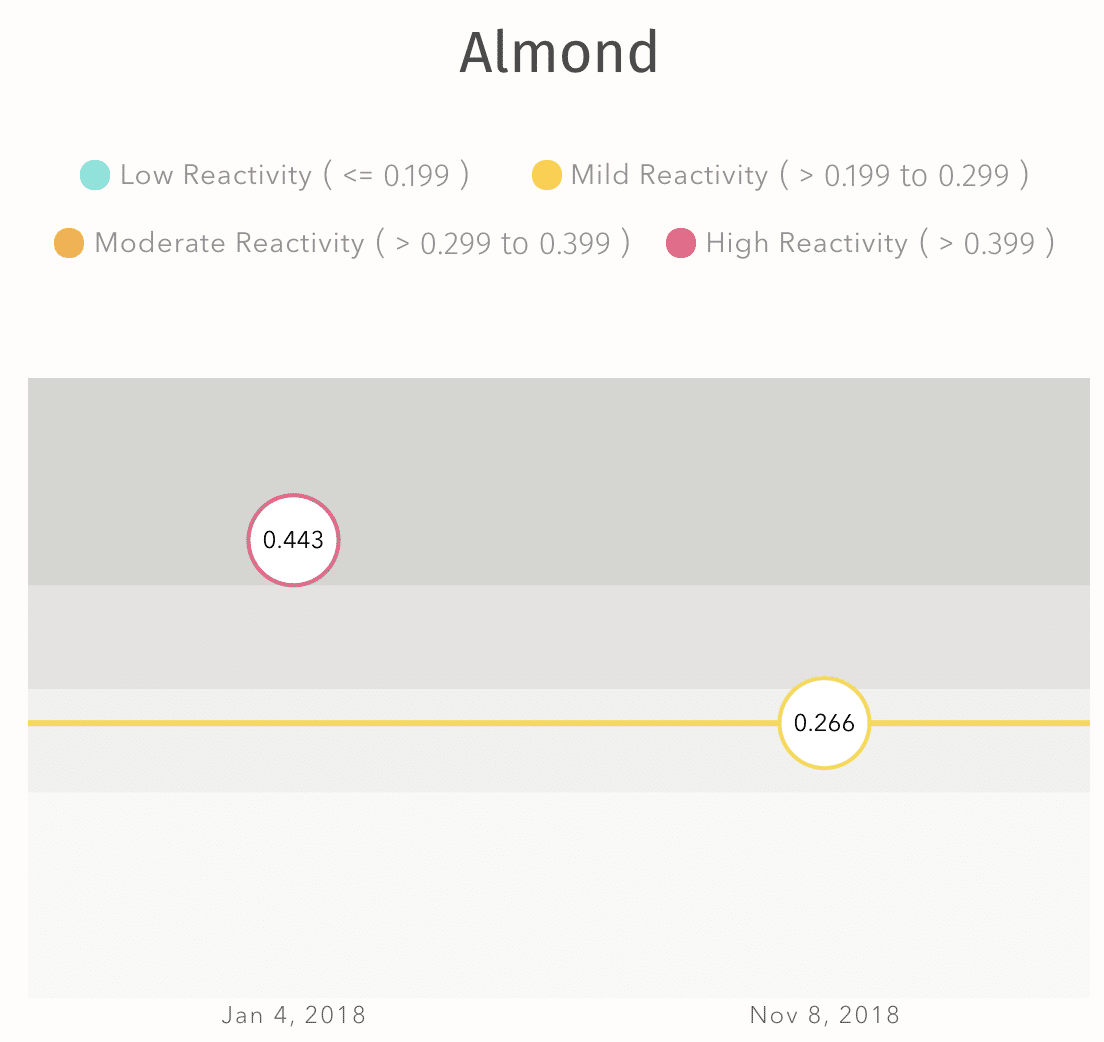
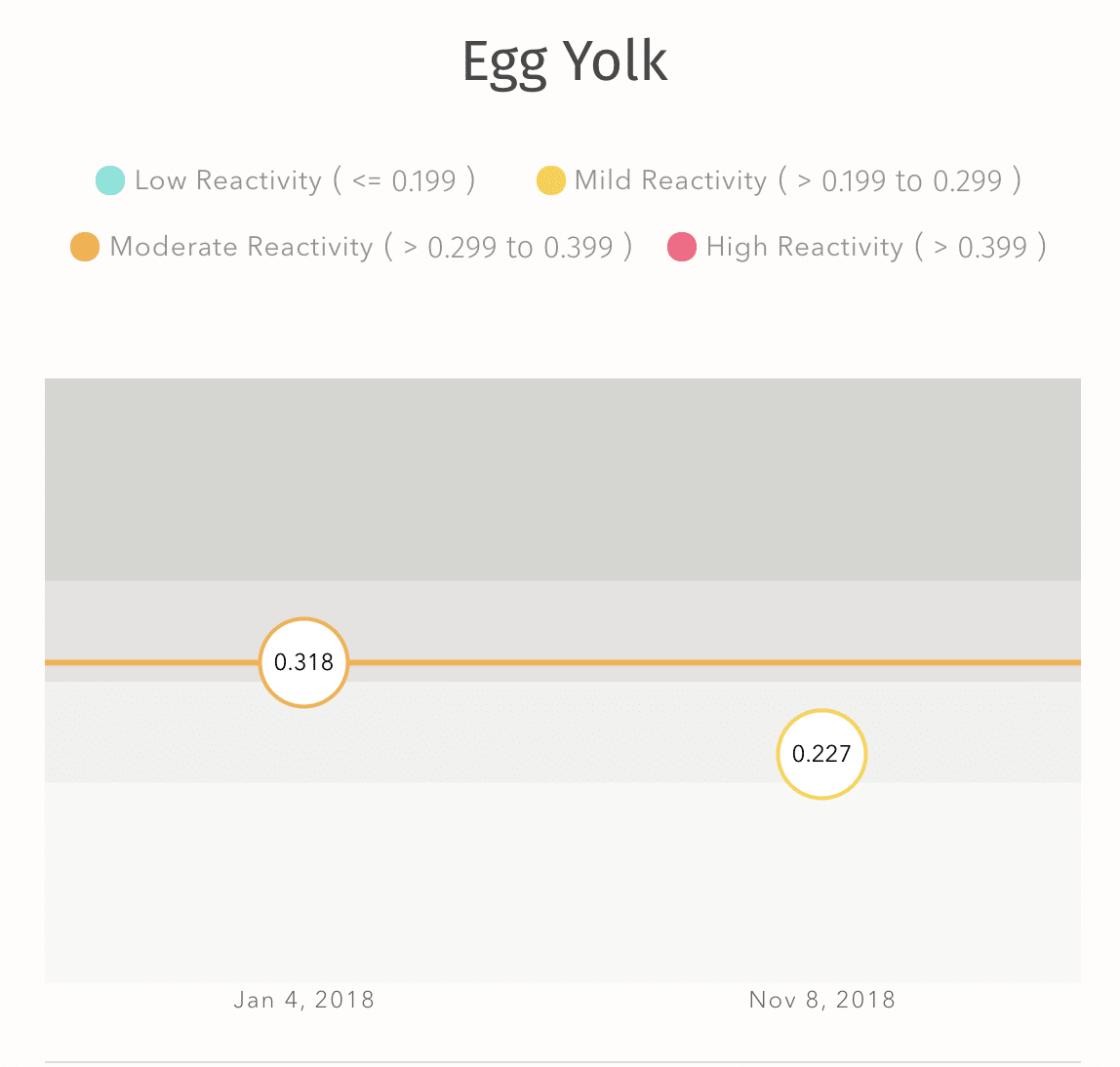
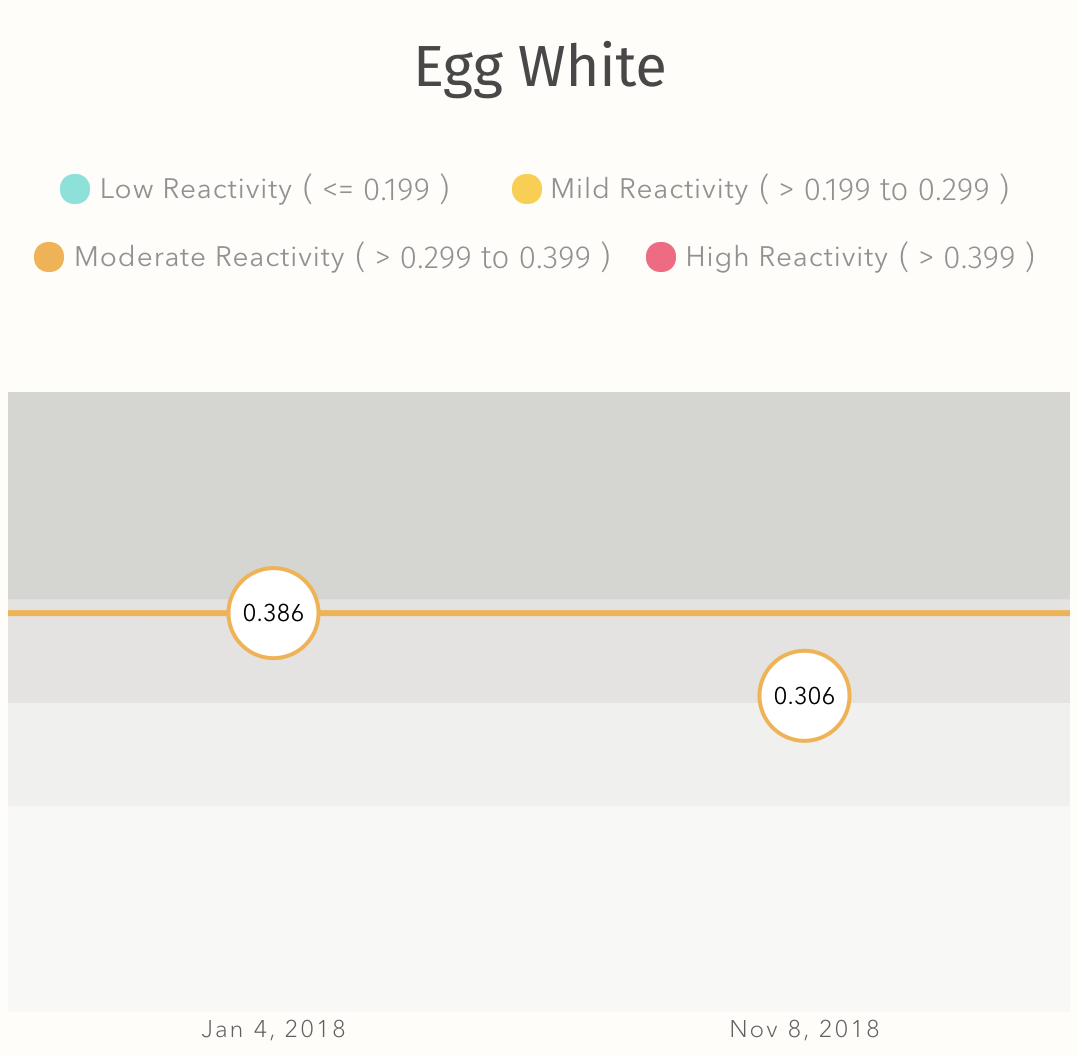
My 80-20 rule when it comes to an anti inflammatory diet:
I follow this rule when it comes to eating anti inflammatory: eat anti inflammatory 80% of the time and indulge a little the other 20%.
I don't go out of my way to indulge a certain percentage of the time, especially if I'm craving healthy food (it happens!), but I also don't beat myself up for enjoying a glass of wine or if there's croutons on my salad.
I'll admit I started by going all in on the anti-inflammatory diet for a month straight to see how I fel and it felt amazing! My body needed it. I slowly started introducing foods back into my diet and found what my body does and doesn't like.
But now I know this and I also know that black and white rules and extreme restriction don't work either. Giving up guilt is huge. Black and white rules focus on reducing things in our diet when in reality we should be focusing on all the foods we should add.
So the moral of my story is this: give yourself some grace, enjoy life and choose foods that serve you
How to eat an anti inflammatory diet during the holidays:
Because of my anti inflammatory lifestyle, going to gatherings, especially holidays can be tricky. Obviously it's okay to indulge on the holidays (without guilt!), but if you're hoping to stick to anti inflammatory foods, or have to because a severe intolerance (like celiac!), then it's great to have options that meet your needs.
I'm a food blogger first and foremost so my food needs to taste GOOD! That's why I created all of these yummy recipes that are anti inflammatory!
Anti inflammatory diet recipes for the holidays:
- GF and vegan green bean casserole
- Gluten free stuffing
- Gluten free cornbread stuffing
- Autumn pear salad
- Dairy free mashed potatoes
- Chocolate paleo pecan pie
- Vegan pumpkin cheesecake
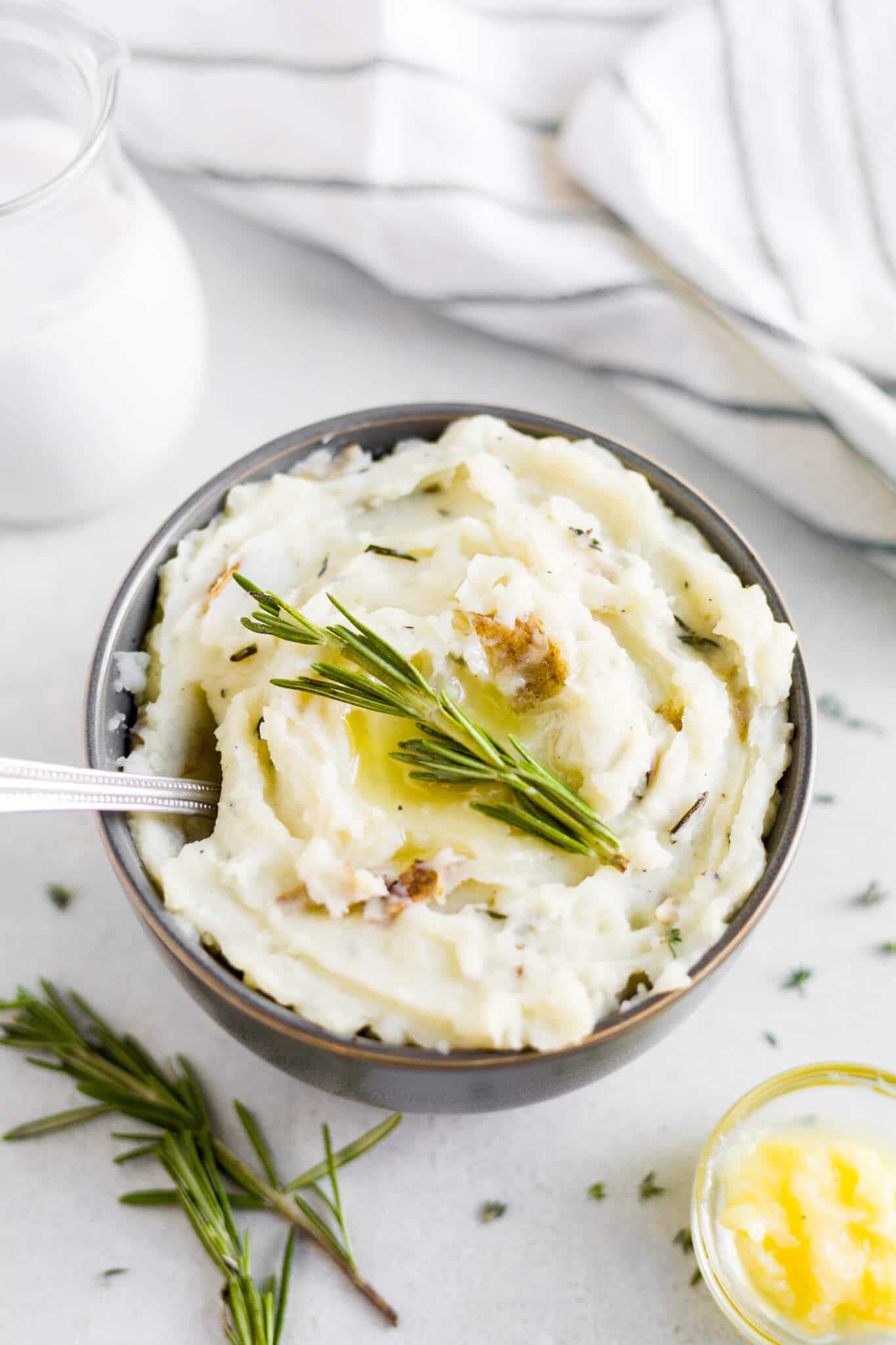
Takeaways for an anti inflammatory diet
I know that was a lot, so I wanted to share a list of the most important take aways:
- Eating an anti inflammatory diet is more than just a "diet", it's a means of feeling better and living your best life.
- Chronic inflammation can result in chronic issues like period problems, headaches, mood disorders, auto-immune diseases and more.
- When chronic inflammation is present in the body, the immune system messengers insert themselves in the "conversation" with our hormone messengers, resulting in "hormonal miscommunication."
- The foods that generally reduce inflammation (unless they are on your food sensitivity test) are: vegetables, fruits, whole grains, healthy fats, spices, fermented foods, bone broth, beans and legumes.
- the foods that can cause inflammation are sugar, alcohol, gluten, dairy and vegetable oils.
- Everyone's body is different and that means certain foods can be inflammatory for you. Take the EverlyWell food sensitivity test to know how your body reacts to food.
- Focus on eliminating inflammatory foods and focus on healing your gut through probiotics and supplements.
- Follow the 90-10 rule to find balance and remove black and white rules.
Anti Inflammatory Diet Meal Plan for Weight Loss
Source: https://whatmollymade.com/anti-inflammatory-diet/